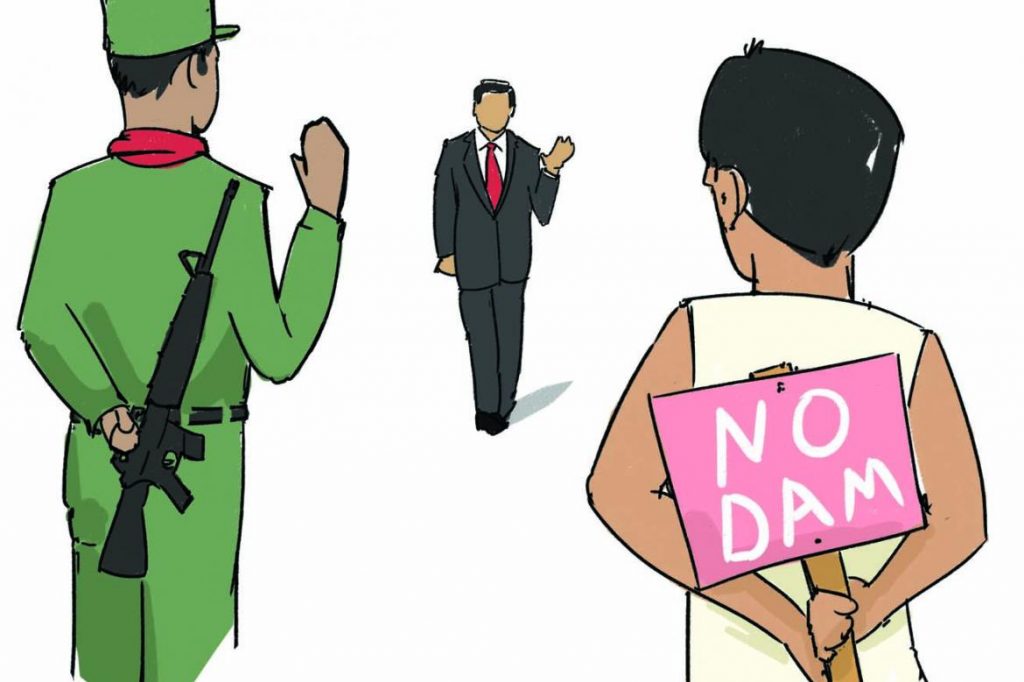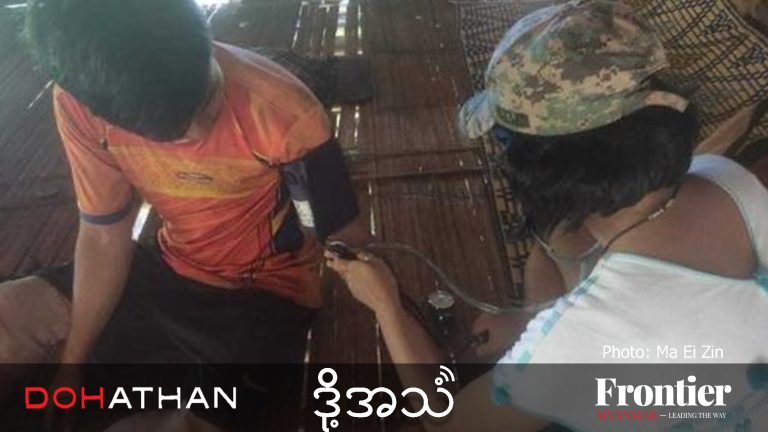The guns of civil conflict fell silent during the visit by Chinese leader Xi Jinping – a pause in fighting that not even State Counsellor Daw Aung San Suu Kyi can achieve.
By KYAW LIN HTOON | FRONTIER
WEEKS before the visit by President Xi Jinping, local media outlets were focusing on the relationship between China and Myanmar.
I especially enjoyed two cartoons drawn by Myanmar cartoonists before Xi arrived.
One showed a fat Chinese man dressed in red talking to three men sitting on the floor. “When we visit, we don’t want to hear any noises,” he’s saying. The three men, who are wearing uniforms and have rifles beside them, reply, “Yes”.
The other cartoon is in two blocks, one above the other. The top one shows rats running in circles and antagonising each other. The bottom image shows the rats all smiles with arms around each other’s shoulders as a big red cat clad in the flag of the People’s Republic of China enters the room with a stern expression.
Support more independent journalism like this. Sign up to be a Frontier member.
The cartoons were caustic comments on the recent quiescence of ethnic armed groups. In the days ahead of Xi’s arrival, the guns of war were indeed silent.
On January 18, a few days after the cartoons were published, I attended a protest in downtown Yangon organised by 14 civil society groups. They called for the cancellation of the China-backed Myitsone dam project and for the government to ensure that the mega-projects sought by Beijing are not to Myanmar’s disadvantage. They also expressed concern about human trafficking to China, and illegal logging and mining by Chinese companies.
The authorities had banned a protest march from downtown to the Chinese embassy in Dagon Township, where the organisers wanted to deliver an open letter to Xi. When the organisers asked if they could travel by car to the embassy, their request was rejected but the police offered to pass on the letter.
The government was obviously taking special precautions to ensure there were no disturbances during the Chinese leader’s visit, for fear of imperiling the country’s crucial relationship with China. But it seemed to me like an unreasonable step.
In August 2016, the same mainly Yangon-based civil society groups issued an open letter to Xi in which they made demands echoed in last week’s document for the Chinese leader: scrapping the Myitsone dam and demanding transparency in other Beijing-backed projects.
“With this letter, we want to reiterate that the Chinese government ensures that Chinese investors and developers respect the concerns of the Myanmar people about issues involving the social and natural environment,” last week’s letter said.
The letter said the civil society groups welcome projects under the Beijing’s Belt and Road Initiative but stressed that the Myitsone Dam project remained totally unacceptable to the Myanmar people.
The letter also expressed thanks to China for its help with the peace process. “But on the other hand, the Tatmadaw and ethnic armed groups have Chinese-made weapons and armour. We feel there is something wrong with this,” it said.
Xi’s visit went well (notwithstanding a certain Facebook translation gaffe). It made consider the importance of relations with China for the destiny of our country. At his meeting with Tatmadaw chief Senior General Min Aung Hlaing, Xi said that China would not sell weapons to ethnic armed groups. He also discussed Chinese assistance in the form of development projects.
However, it’s obvious that China is taking advantage of Myanmar; border trade is one example of this exploitation. Chinese traders are getting a better deal because Beijing officially prohibits the import of rice and cattle. It is difficult for Myanmar people to expect genuine goodwill from China in every aspect of the relationship.
At a teashop during Xi’s visit, one my friends made a joke about the pause in civil conflict. “Please Mr Xi, stay longer in Myanmar so we can continue to enjoy the taste of peace,” he said. Even when Nobel peace laureate Daw Aung San Suu Kyi travelled to areas near the border with China, fighting continued.
That’s why I’ve decided to call Xi Myanmar’s “peace god”.







